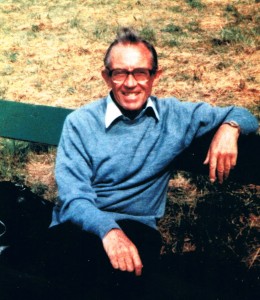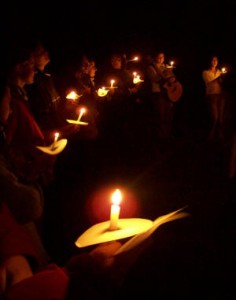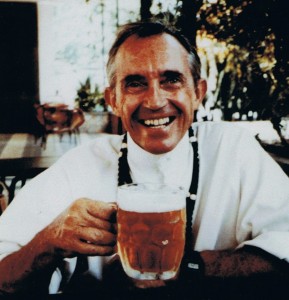Spreading the Gospel:
Posted by Fr. JonathanJan 13
Spreading the Gospel
The Parish Pastoral Council has been discussing the question about how do we in our parish evangelise. It is something that has exercised us priests in our parish more and more. It is by no means easy to find answers, and the matter comes up again in out next PPC meeting. How many times have we monks also talked about it among ourselves, and for Fr. Ambrose of sacred memory it was his passion.
Fr. Ambrose reminds me of the words of Elijah the prophet to God as found in 1 Kings 19: 9-11. The account goes like this:
At God’s mountain he went into the cave and spent the night there. Then the word of the Lord came to him saying, ‘What are you doing here, Elijah?’ He replied, ‘I am full of jealous zeal for the Lord of hosts, because the Israelites have abandoned your covenant, have torn down your altars and put your prophets to the sword. I am the only one left, and now they want to kill me.’
The people of England have not as yet destroyed the Church, but the Church is very weak, and few keep to the implications of their baptismal promises, and in effect the majority who ignore the Gospel and the necessary worshipping of God together on the Lord’s Day have for themselves torn down the altars. They ignore the prophets so it seems.
We have had discussions in a small preparatory group for the PPC and we did come up with some ideas. They need testing, so enough of them. Last night I thought I would look at a book of personal meditations written by a Missionary of Africa, a friend of mine called Fr. Herbert Herrity from Scotland who for me is also of sacred memory and many others. The book is called “Doodles in the Dust” and is about his time in Northern Ghana from 1955-1991.
He was so authentic and engaging that what happened to him and his reflections and reactions, always genuine, sincere and ‘different’, have left a lasting impression on me. They may help some others too. Certainly I identify completely with his description of what he was trying to do as a priest in Northern Ghana with what I attempt to do here in North West England.
In this incident Fr. Herbert was invited to the base camp of a surveyor friend he met, a Newcastle man who was engaged on building a big road. The first night another English lady turned up, doing field work in anthropology among the native people of Northern Ghana. The three of them were chatting after their evening meal together: each was in Ghana for different reasons: one earning a good salary as a surveyor, the other preparing for a University degree and the English lady turned to Fr. Herbert and asked him “And what are you doing here?” Fr. Herbert writes in this anecdote:
It can be difficult to explain fundamentals, the things that you take most for granted and have built your life on. Probably it is because they are so fundamental that they are difficult to talk about. Phrases like ‘save souls’, ‘build the Church’, ‘make Jesus known and loved’, ‘bring people to Jesus’ kept racing around in my head; but these answers would not do. To be honest, I felt very self-conscious as I struggled for words. But it was a good a good question, and I am so glad she asked it.
The Church repeatedly asks itself why it must be necessary. Neither the White Fathers nor the Church can speak for me. I must speak for myself. Why am I here in this remote village: what am I trying to do? Why am I a missionary?

Fr. Herbert in Africa as he might have told this anecdote.What I actually said that evening I do not remember now, but I hope I said something like this.
‘I am a missionary because that is what God wants from me in my life.’ ‘Are you sure?’ ‘Absolutely!’ ‘And what makes you so sure?’ Firstly it would take too long. Secondly, because it is rather private. There is always, deep inside everyone, a part of us marked “Private to God alone”. But I can say this; when I look back and see how God has been leading me and working with me, I have no doubt that He wants to be a missionary. After all, if He wants me to do something, He owes it to Himself to inform me. ‘If the trumpet issues an uncertain sound, who will prepare for battle?’ But He has informed me to my complete satisfaction.
What am I trying to do?
Quite simply I am trying to love the people God has put beside me. They include other White Fathers, parishioners, visitors to the house, in short anybody that God sends me in my life as day follows day.
I want to love them with the love of God i.e. not self-centred human love but the unconditional, unlimited love of God. I want to love them in the way they want to be loved, not the way I or anyone else chooses to love them.
I want to love with the love that the Father infuses in me.
‘Who lives in love, lives in God and God in him’. To love in this way is freedom, for myself and also for the other. With it goes a joy that must always have been with Jesus. Little is said of the joy of Jesus in the New Testament.
I believe that the only right I have in this life is to love; not to be loved or appreciated but to love. Of course, , no one will ever take that right away from me.
I know this sounds wonderful; just too good to be true. I agree. But isn’t it good to have the ideal before us in spite of the fact that we all fall so short?
As I look around I get the impression that the world is not short of clever, even brilliant intellects; but it is short of love and loving people.
I imagine that when Africans look at their missionaries they are not looking for builders or organisers in the first place; nor for wealthy people who have access to money or resources. They just want people with the love of God in their hearts; people with time and sympathy and understanding.
I SOUGHT MY GOD BUT GOD WAS FAR FROM ME;
I LOOKED FOR ‘MAN’ BUT MAN ELUDED ME,
I SOUGHT MY BROTHER AND I FOUND ALL THREE;
MY GOD,MY SOUL AND ALL HUMANITY.



No comments